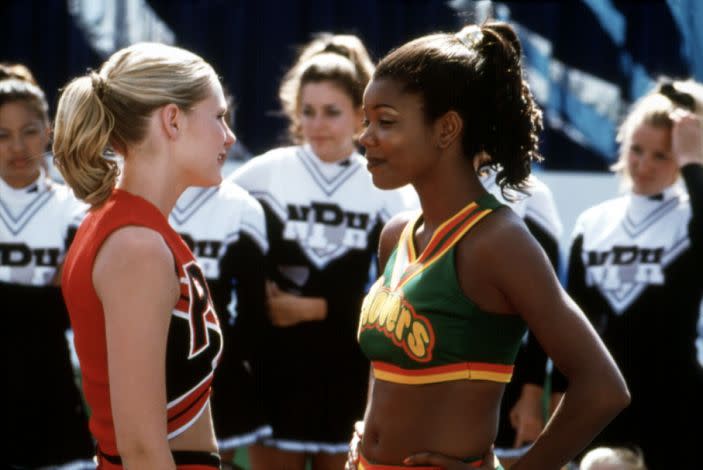'It was always about cultural appropriation': 'Bring It On' creators look back as cheerleading favorite turns 20
There have been plenty of comedies from the ‘70s and ‘80s and ‘90s that have not aged well — even some from the ‘00s and ’10 — as our social awareness heightens and evolves.
Bring It On, on the other hand, feels like it’s gotten more relevant in the 20 years since its release. The comedy, which Roger Ebert once called “The Citizen Kane of cheerleading movies,” follows a mostly white suburban cheer squad whose apprehensive new captain Torrance (Kirsten Dunst) discovers her predecessor stole all of their best routines from an inner-city, predominantly Black troupe lead by the self-assured Isis (Gabrielle Union).
“It was always about cultural appropriation,” says director Peyton Reed (Ant-Man) in a new interview with Yahoo Entertainment celebrating the film’s 20th anniversary, where he was joined by screenwriter Jessica Bendinger (watch above). “That was such a unique thing at the time. I hadn’t seen that in a movie and [it] was one of the things that really grabbed me about it.”
“It was definitely in mind for me,” says Bendinger, a former hip-hop journalist who was inspired by the racial dynamics of the genre as rap became more mainstream, and who faced 27 rejections for the project — originally called Cheer Fever — before finally selling it to Universal.
“These were rivals and it was about, how do we level the playing field?” adds Reed. “Weirdly now, where we’re all talking about not only cultural appropriation but we’re talking about these issues of race, you’re dealing with a movie where the protagonists were five-time national champions in cheerleading, but that was all built on the backs of this theft. They’d been outright stealing these routines.”

Watching Bring It On, it’s clear that the Compton-bred Clovers are the more talented troupe, but given the traditional Hollywood arc of lead characters overcoming adversity to win it all, not to mention a history placating white audiences, it wouldn’t have been surprising if the Torrance-lead Toros prevailed.
“The Clovers always were the winners, the clear winners,” Bendinger says about plotting the film, pointing to the 1976 classic Rocky — in which Apollo Creed took down our scrappy underdog hero The Italian Stallion — as an influence. “We invoked Rocky quite a bit.”
“We never saw the Clovers as antagonists, they were rivals,” says Reed. “That was the Rocky ending. For Torrance, they came in second but it felt like first to her. She’s taking her first steps into awareness.”
Dunst, who had broken out as a child actor in films like Interview With the Vampire, Jumanji and Little Women, was only 17 when she appeared in the film — a full 10 years younger than her co-star Union, who was also already a working actor.
“It was never an issue,” says Reed. “In a great way, you felt it, that she was just more self-possessed. She was very clear about who she was, as opposed to Kirsten’s character Torrance whose world has been rocked and who’s on the backfoot and she’s trying to figure out what this means. Her sort of white privilege world has been exposed and she’s trying to figure out how to become more aware and make it right.”
Bring It On is currently streaming on Amazon Prime.
— Video produced by Gisselle Bances
Watch our full interview:
Read more on Yahoo Entertainment:

